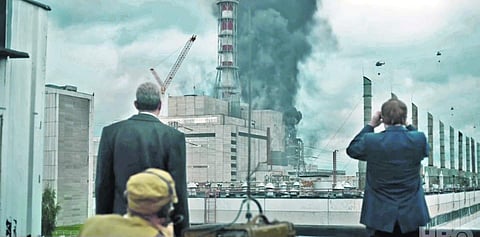Chernobyl Review: Riveting, and utterly revealing
Rating:(4 / 5)
Friedrich Nietzsche said, "All things are subject to interpretation; whichever interpretation prevails at a given time is a function of power and not truth." This quote rings ever so true when it comes to HBO's latest offering, the five-episode mini series, Chernobyl. Set towards the end of the Cold War era, this story about the Chernobyl nuclear disaster is as much about the truth behind the incident as it is about the powers that be of the Soviet era.
Cast: Jared Harris, Stellan Skarsgård, Emily Watson
Director: Johan Renck
Created and written by Craig Mazin (best known for writing The Hangover trilogy), Chernobyl is a harrowing blow-by-blow dramatised version of the incident. The tone of the miniseries is set from the start with a man, later to be identifed as Valery Legasov, deputy director of the Kurchatov Institute of Atomic Energy, recording a series of confessions on tape before taking his own life. All while a cat is slowly going forward with its nightly dinner routine. This cat is not a lone ranger though as a series of animal motifs dominate this series. In another poignant scene, an old lady is milking the udder when she is asked by a soldier to vacate the area. This 82-year-old old laughs off the naive youngster as she recounts how the harshest of Russian stories - from Lenin, through Stalin and Hitler - hasn't pushed her off from her place. Yet, what happens next is sure to chill you to the bone as you see what power does to people. Episode 4, ironically titled Happiness of All Mankind, has the most heartbreaking moments when it comes to animals. Let me just say that no youngster joining an army should undergo a rite of passage like what's shown.
But the ones that bear the brunt of the impact of the fallout (pun intended) are the humans. The people who worked in the nuclear reactor, the first responders, the police, the army, the miners... But most of all, it is the naive common Soviet, who upon seeing the distant fires of the Chernobyl nuclear plant, goes out to watch the blue gaze dotting the air whilst letting his/her children play with the radioactive dust. I guess the curiosity of the human mind is insatiable, and when disasters don't get reported as they should be, the curious human suffers. Valery Legosav (a brilliant Jared Harris) asks us (and maybe himself too), "What is the cost of lies? It's not that we will mistake them for the truth. The real danger is that if we hear enough lies, then we no longer recognise the truth at all." It is telling that this dialogue, aimed at the apparatchik nature of Soviet Russia, is still resonant in the world we live in right now. The people live in a bubble, delicately curated by the State over years, and they are happy living in it. When the plant's executive committee meets up soon after the disaster, an old man called Zharkov says, "It is my experience that when the people ask questions that are not in their own best interest, they should simply be told to keep their minds on their labor and leave matters of the State to the State."
But everytime the State tries to thumb people down, they rise to fight back. Like James Cosmo as a miner or Emily Watson's Ulana Khomyuk, whose fightbacks are some of the best written scenes in the show. While writing is a strongpoint in scenes featuring Ralph Ineson's Nikolai Tarakanov, an army general in charge of men who clean up the Chernobyl area, and Stellan Skarsgård's Boris Shcherbina, a minister on the Central Committee in charge of Fuel and Energy, it is more the technical brilliance that really stands out. The latter's role especially is hands down career-defining and the highlight of the series. The blocking of the scene when Shcherbina and Legasov meet for the first time is fantastic. All you need to see is the seating arrangement of Shcherbina and Legasov from that moment till the end to understand the power of a director who knows how to use space on screen to tell a compelling story.
The smoke arising out of the fire is a character unto itself and when combined with the dreary Russian landscape, there is an almost Stephen King-esque horror feel to the whole film. The land, water and air also take their fair share of hurt, thanks to the humans. That the director alternates between deep focus shots, establishing shots, steadicam shots and steady shots shows the painstaking effort that has gone into framing each scene.
Less than 50 years since the world was made aware of the possibilities of nuclear power, the Chernobyl disaster of 1986 arrived to shake this very foundation. This series arrives at an important moment, not just because of what it says but also because of how it says it. The final episode is titled Vichnaya Pamyat and it stands for Memory Eternal. Let us hold in our memories what Legasov represented, what he put so eloquently, "The truth doesn't care about our needs or wants. It doesn't care about our governments, our ideologies, our religions. It will lie in wait for all time. Where I once would fear the cost of truth, now I only ask: What is the cost of lies?"

